Dark Imperium Read online
Page 9
The Macragge’s Honour rocked to the impact of multiple hits.
‘Master Divulgatus, send my words to the fleet,’ said Guilliman.
‘My lord,’ the Master Divulgatus replied.
‘The station is destroyed!’ said the primarch. ‘The way is open. All landing ships move forward. Begin deployment of main ground attack. In the face of their fire, put down your armies and your legions. Generals of the Imperium, it is time to scour this world clean.’
Chapter Seven
Last Flight of the Greyshields
A furious shaking gripped the Rudense. The wailing of alarms filled the air, accompanied by the dull, edge-of-hearing crackle of void shield generators working to capacity. Then the clamour was done. The insertion craft broke through the enemy line, and the Unnumbered Sons readied themselves to go to war one final time.
‘Brothers, we are approaching the insertion point,’ voxed Lieutenant Sarkis. ‘Drop in two minutes. Begin final preparations. Imperator victoriam!’
‘Victoriam!’ his warriors replied.
Of the many tens of thousands of Primaris Space Marines created by Belisarius Cawl, only half were initially formed into new Chapters. The rest had been gathered into great armies, each of one gene-line. They wore the livery of their founding primarchs, their badges crossed with pale grey chevrons, and within their gene-groupings they were then further organised into Chapter-sized formations.
There, agreement with the Codex Astartes ended.
Guilliman deployed his new weapons in every way imaginable. The Primaris Space Marines sometimes fought as the Legions of old had, in huge formations of one type, but they also fought in mixed groups of every size, from strike teams of five up to double Chapter strength. They knew the strengths of their gene-cousins, and their preferences. Brotherhood crossed the lines of primarch and gene-seed. Officially, they were designated the Unnumbered Sons of the Primarchs, but they called themselves the Greyshields. They were the new sons of old science, and they had no fraternity but their own.
As the Indomitus Crusade progressed, the Unnumbered Sons had dwindled. Roboute Guilliman took them from their companies and their squads, and he assigned them to understrength Space Marines Chapters encountered on the way. Whole companies might be hived off, or only a few units. Sometimes the primarch took them by the hundred to create new Chapters where he saw the need: to guard important worlds, or to scour an area of space, or to perform whatever other task he deemed important. Warrior by warrior, the Unnumbered Sons were scattered across the galaxy, taking with them the secrets of their creation to their new homes. Sons of Guilliman became Aurora Marines or Doom Eagles; sons of Dorn joined the Black Templars or the Imperial Fists; sons of Corax became Raven Guard or Revilers. By the time the fleet reached Raukos, only twenty thousand of the Unnumbered Sons’ original strength remained in the Indomitus Crusade.
For one such mixed brotherhood, the final battle approached.
Sergeant Justinian and his Inceptor squad hung from robotic drop arms. There were three warriors in each unit and six units in their bay, along with their leader, Lieutenant Sarkis. Cordus, scion of the line of Guilliman, flew with Justinian, as did Aldred of Dorn’s breed. In the ship’s other two drop bays, thirty-six more Primaris Space Marines awaited battle. They were giants clad in drop armour – Inceptor battleplate reinforced for solo atmospheric re-entry – and equipped with heavy jump packs for sustained flight. For armament, they carried paired assault bolters. Like their armour, these guns were one of Belisarius Cawl’s heretical marvels, massive pistols with the stopping power of heavy bolters.
In the dark bay, lit only by the winking lights of machines at their work, Justinian’s comrades were outlines edged in green and red. His view was restricted by a massive jump pack. The warrior before him was Solus, his friend, though only the Baalite red of his plate, blood dark in the drop hold, gave his identity away. His back was high and round like that of a monstrous beetle, the backward-pointing nozzles a pair of steel-toothed maws. Solus was so still, and his suit so large, that from the rear he appeared wholly robotic. No trace of the man inside could express itself through the layered ceramite.
‘Exloading mission data. Prepare armour cogitators for cant reception,’ said Sarkis. Justinian’s earpiece chimed. ‘Activate drop overlays. Mission active.’
The overlay obstructed more of Justinian’s limited view. Pulsed lasers flickered at the edge of his eye-lenses, projecting a false-world faceplate display directly upon his retinas. The giant reticle of a drop pelorus blinked in front of him – two stationery circles contained by cross hairs, all divided by fine rules of measurement. The mission count glowed a dull orange, all eight digits at zero.
‘Programme drop coordinates. Beta-7987-3872, Kappa-0031-4822. Confirm,’ said Sarkis.
The overlay took up the whole of Justinian’s sight. Though it existed only in the witch world of the squad’s minor noosphere, the pelorus seemed to hang solidly in the air before him. Using the neural links connecting his nervous system to his suit and its cogitator, he brought the coordinates onto the grid. The display’s large wheel turned within its twin, shifting through three dimensions as the Rudense ploughed its way towards their drop point and his armour tracked Justinian’s position. A faint roar came from the ship’s engines, the vibrations conducted directly to Justinian’s armour by way of the drop claw. The gentle pushback of oppositional forces grew stronger as the craft accelerated. The Rudense always came in fast.
‘Confirmed,’ said Justinian. Indicators on his display blinked green as he homed in his suit’s auto-senses and cogitator on the drop zone. Paired runes flickered to the same colour in the top left – his squad was also locked on. ‘Squad confirmed.’
The other sergeants acknowledged mission readiness as their own suits processed the drop data.
‘Thirty seconds to planetary drop,’ said Sarkis. ‘Final weapons check.’
Justinian went through the procedure automatically, barely conscious of what his hands were doing. Runic indicators flickered, half obscured by the drop pelorus dominating his view. Drum magazines on his assault bolters span around once, ammo feeds clicking. Chimes informed him all was well. The machine spirit of his Inceptor suit performed a number of automatic adjustments. Hissing atmosphere lines increased his internal suit pressure. The reactor beneath his jump engines whined into high output mode then back again, and his jets gave a single hollow huff that jolted him in his harness. In front of him, Solus’ jets ignited a second later, metal teeth spinning around a trapped vortex of blue fire, then went out.
A schematic of his armour blinked in the upper right of Justinian’s view, segments switching from amber to green. He was only half watching all this. He trusted his battleplate’s spirit to ready itself once the ritual activation had set it on the appropriate path. The ship shook hard. The engines’ voices changed timbre. The push of acceleration shifted around his body as the ship curved away from an unseen threat. Several more jarring shakes followed as the Rudense came under fire.
‘There is a firestorm out there,’ said Sarkis. ‘The enemy are displeased to see us.’
‘Was that a joke, Sarkis?’ said Bjarni, born of the line of Russ.
‘I do not joke,’ replied the lieutenant.
‘A wry comment then,’ said Bjarni. The wolf’s son was hanging from the drop line next to Justinian. He tapped him on the arm with the butt of his assault bolter. ‘Wish me luck, brother,’ he said quietly. Vox-beads fed his voice directly into Justinian’s ears.
‘Why do you need luck more than the rest of us?’ Solus interrupted.
‘It’s my thirteenth planetfall,’ grumbled Bjarni. ‘An ill-favoured number.’
‘The primarch’s Legion was the thirteenth! Do you not remember?’ said Justinian.
‘Why would I forget?’ replied Bjarni. ‘But where is the Thirteenth Legion now?’
‘Made into Chapters ten thousand years ago, for the greater good of the Imperium,’ said Cordus.
‘Broken into pieces you mean,’ said Bjarni. ‘I do not want to be broken into pieces.’
Red lumens flashed. The air was sucked out by powerful fans. The noise in the bay went with it.
‘Doors opening, doors opening, doors opening,’ droned a machine voice.
The narrow bay doors slid back, letting in a corridor of bright sunlight unsoftened by atmospheric diffraction. Residual ship air froze upon the metal of the Primaris Space Marines’ armour, bringing a diamond sheen to the battleplate. The drop arms went into action, pushing them out from the side of the ship, through a hull five metres thick, and into the fury of void war.
The Rudense was a small ship of a class designed specifically for the Indomitus Crusade. Its Adeptus Astartes complement was set at fifty – not even a full company. But the warriors aboard had an important role, one never seen in the armies of the Space Marines before the Ultima Founding. Slender as a dart, seven hundred metres long and as fast as its shape suggested, the Rudense was heavily armed for its size class, and strengthened to withstand brushes with planetary atmospheres. It was a rapid insertion craft, intended to fight its way through the maelstrom of close-range orbital combat and deliver its payload to the surface directly from the edge of a planet’s atmosphere.
It only had small hangars and no drop pod tubes. The Rudense was something new, and it had taken the enemy by surprise many times.
Explosions burst around the Rudense, and Justinian’s helm lenses darkened against the dazzle. Lasbeams stabbed from the ship’s side out to infinity. The wide rays of defence lasers slammed up from the planet below, but the Rudense was artful at deception, and it was never where the lasers fired.
A massive explosion ahead sent shivers along the ship. The Space Marines swung below their drop arms. Flaming debris span past, wreathed in dying sparks and glittering ices. An escort of interdiction fighters accelerated and fell in alongside the Rudense, weaving through the turmoil and then off ahead, guns blazing. Justinian’s view of the battle was limited by the projecting shields sheltering the Primaris Space Marines from the deadly impacts of micro shrapnel and direct attack. Behind, the ship’s iron immensity blocked off everything. Somewhere beyond that great metal cliff, larger ships would be fighting.
For all the fury of the anti-ship fire streaking up from the surface, beneath Justinian’s feet the world floated peacefully by, its ochre surface hazed by the blue of a thin atmosphere mottled with clouds and their shadows. He had seen many worlds from this vantage point. He had thought he would grow jaded at the sight eventually, but he never had. Every world was different, and when viewed from this height, every world – whether hell or paradise – had been beautiful in its own way.
‘The calm before the storm, brother,’ said Solus, as if reading his thoughts.
‘These places we fight for,’ said Kalael, his armour the green of the Dark Angels. ‘How small they are. We hold that to ourselves as a secret truth. From space, every world is but a fragile glass ornament against the infinite black.’
‘Ten seconds. Nine seconds. Eight seconds…’ The machine counted down.
Justinian kept his eyes on the planet. Flashes of light burst further along its curve, drawing closer as the ship raced towards the battle site. Ground combat from orbit looked deceptively celebratory, a display of multi-hued explosions and storms of light that appeared too artful to be destructive. Shock waves burst clouds apart, and he spied Titans lumbering away from their coffin ships. Beneath the sheath of air, the giant war machines were like aquatic insects that had never learnt how to swim, doomed to laboriously plod along the pond floor.
‘Battleground two hundred and fifty kilometres and closing!’ said Sarkis, his excitement revealing itself as a slight rise in his voice. ‘Prepare for drop! Emperor preserve us in our flight and grant might to our fists!’
‘Four seconds. Mark,’ said the machine voice. ‘Three, two, one. Drop. Unit 10-5011/32A away.’
The drop arm disengaged from Sarkis’ back. The claw that held him dangling over the planet’s sky opened silently. A disposable thruster burned on top of his drop pack, shooting him towards the target zone, and the black-clad son of Ferrus Manus fell away. The booster exhausted its fuel supply quickly and detached. Sarkis fell without a word, plummeting towards the world as surely as a cogitator-guided munition. There was a flaring burst of jets as he corrected his course, and he was gone. Half a second later, the machine intoned Bjarni’s Primaris number. The wolf’s son fell with a whoop, a grey streak, his squad going one, two after him, swift as heartbeats, their impeller jets burning and detaching.
Then it was Justinian’s turn.
‘Unit 13-10889/189E away,’ said the machine, and let him fall.
The claw’s release was gentle as a kiss, the firing of the impeller hard as a punch. It ceased after a second’s burn. Justinian felt it come away from his jump pack, a bump in his otherwise smooth flight.
Justinian plummeted. The long, slender shape of the Rudense vanished overhead, becoming a blade of light in the sky surrounded by the starbursts of orbital combat. The ship drew away, trailing a wake of false lightning through the world’s magnetosphere and chased by the stabbing beams of enemy lances. Enemy fighters sped after it, drawing their own lines in the sky. Naval interceptors approached obliquely. They made marvellous patterns about the cruiser.
Justinian fixed the sight in his memory, and ordered his armour to capture a series of images at fifty millisecond intervals. Maybe if he survived this, he would paint the war in space. Justinian liked to paint.
The pelorus’ nested reticles shifted slightly, and he looked down. The circles tilted within one another, providing him with a false horizon and a vertical gauge to set his descent by. Cordus and Aldred were bright orange teardrops drifting across the circles, the members of the other squads yellow dots spread above and below.
A blue line rose up the display towards him. The atmosphere of 108/Beta-Kalapus-9.2 was thin. It would take him twenty minutes to fall to the ground.
For minutes he fell in silence. The surface was so far away he appeared to be making no progress.
There is no sharp delineation between a world’s air envelope and the void, but instead a region of increasing attenuation where, atom by atom, air gives way to vacuum. But there does exist a point where the air becomes thick enough to support atmospheric flight – the Kármán line – and there, air becomes thick enough to feel. Justinian hit it with a jolt. Heat followed almost immediately as friction, imperceptible only moments before, quickly built around his armour. A plasma-torch roar filled his ears.
The coming moments were critical. Gaining a good angle of descent at this stage would ensure mission success – a colourless statement that meant only that he would not die before the enemy got a chance to shoot at him.
An alarm sounded in his ear. Cordus’ signifier flashed.
‘Cordus, correct course two points vertical, you are drifting,’ said Justinian.
‘Yes, brother sergeant,’ Cordus responded. His signifier dot and its accompanying rune moved across Justinian’s display, and the graphic ceased blinking.
The others spread out into a wide dispersion pattern. Three targets awaited the demi-company’s attention: a series of closely bunched bastions, each one bristling with ordnance.
A bright corona of heat streamed around Justinian, most intense about the reinforced ceramite of his boots. It became uncomfortable, but not dangerous. Provided there was no breach in his Inceptor battleplate, he would be safe.
Soon after, he reached terminal velocity and stopped accelerating. The curve of the world grew quickly, filling his vision with the ground. As the minutes passed, space retreated to the periphery of his vision and vanished. When the last of the black was gone, he finally felt like he was falling. Individual
surface features resolved themselves, details popping into sharp definition, though all were flattened by his relative height, so that mountains appeared as painted flourishes upon a round canvas.
Below him, fighting raged upon a plain bordered by a range of hills pierced by a wide valley. Across the valley mouth was a great wall, and a strong fortress not far behind. Two battle lines became visible. Their exchanges of fire were startling weaves of light. A vast phalanx of Astra Militarum tanks, supported by Adeptus Mechanicus cyborg troops and war machines, advanced on the wall from the drop zone.
The wall looked like a ribbon, but in truth it was almost one hundred metres tall, and forty wide. The Titans of the Legio Metalica swelled, their carapace insignia taking on form. They were now the size of men, and the warriors milling about their feet had become the insects. The scene grew before Justinian’s eyes, unfolding like a fractal tapestry.
Aircraft sped below, swift as avians, duelling with draconic daemon engines for control of the sky.
‘Demi-company split,’ ordered Sarkis. ‘Squads to target designated mission objectives in three, two, one. Fire jets. Formation disperse.’
‘Fire jets!’ ordered Justinian. A smaller reticle ignited in the centre of his pelorus and settled over his own squad’s landing zone: the middle tower of the wall. The tallest one.

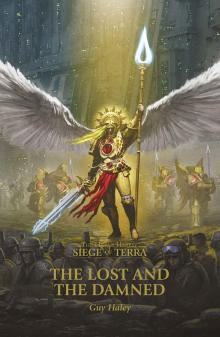 The Lost and the Damned (The Horus Heresy Siege of Terra Book 2)
The Lost and the Damned (The Horus Heresy Siege of Terra Book 2)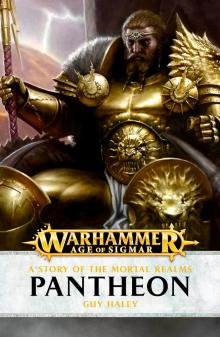 Pantheon
Pantheon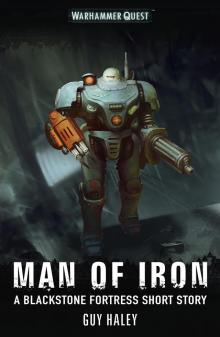 Man of Iron
Man of Iron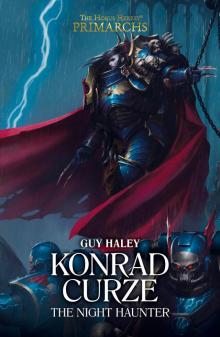 Konrad Curze the Night Haunter
Konrad Curze the Night Haunter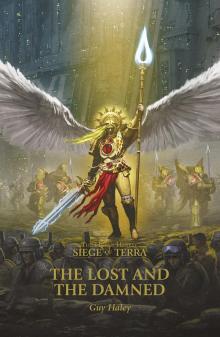 The Lost and the Damned
The Lost and the Damned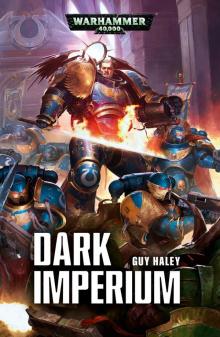 Dark Imperium
Dark Imperium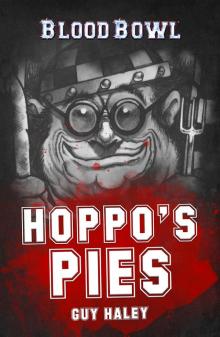 Hoppo's Pies
Hoppo's Pies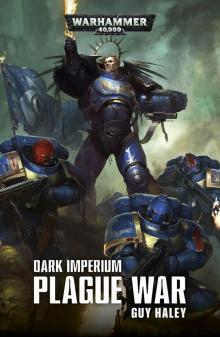 Dark Imperium: Plague War
Dark Imperium: Plague War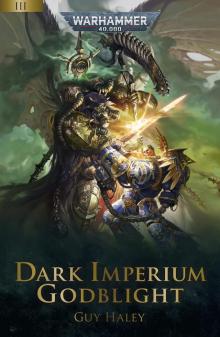 Dark Imperium: Godblight
Dark Imperium: Godblight Crash
Crash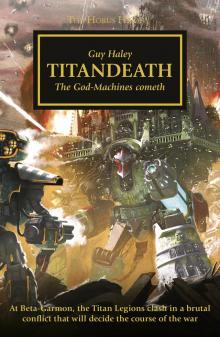 Titandeath
Titandeath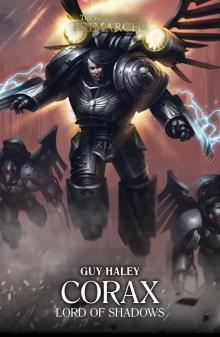 Corax- Lord of Shadows
Corax- Lord of Shadows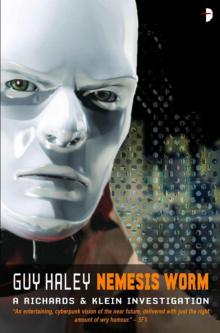 The Nemesis Worm
The Nemesis Worm Wolfsbane
Wolfsbane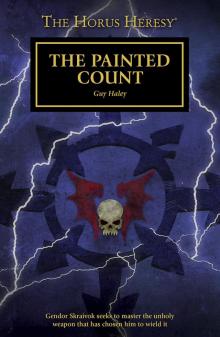 The Painted Count
The Painted Count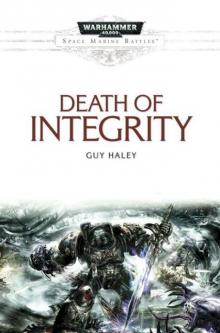 The Death of Integrity
The Death of Integrity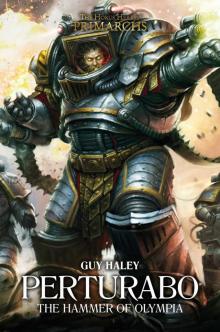 Perturabo: Hammer of Olympia
Perturabo: Hammer of Olympia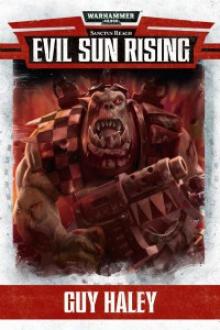 Evil Sun Rising
Evil Sun Rising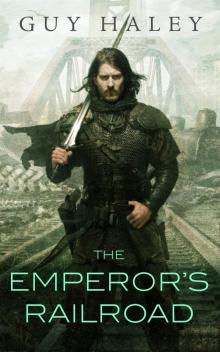 The Emperor's Railroad
The Emperor's Railroad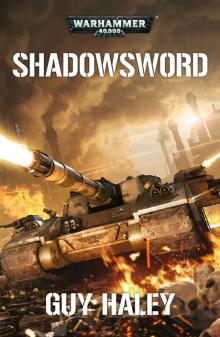 Shadowsword
Shadowsword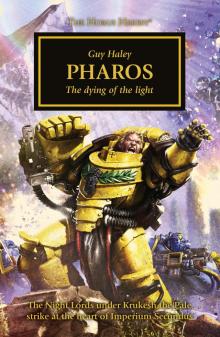 Pharos
Pharos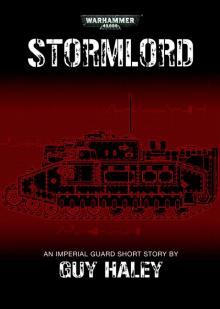 Stormlord
Stormlord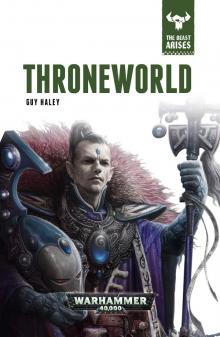 Throneworld
Throneworld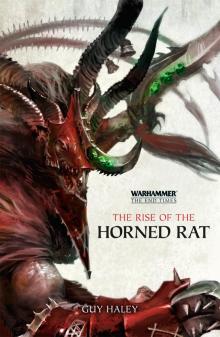 The End Times | The Rise of the Horned Rat
The End Times | The Rise of the Horned Rat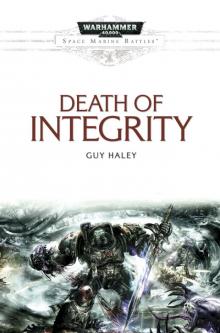 Death of Integrity
Death of Integrity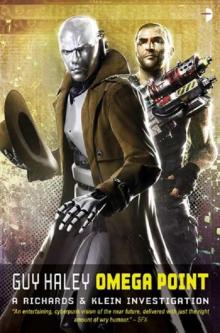 Omega Point
Omega Point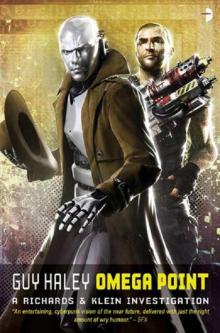 Omega point rak-2
Omega point rak-2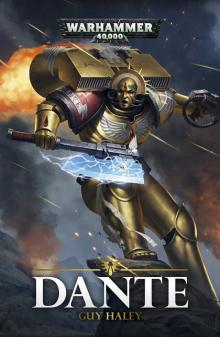 Dante
Dante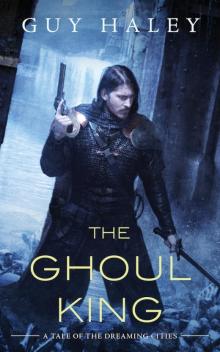 The Ghoul King
The Ghoul King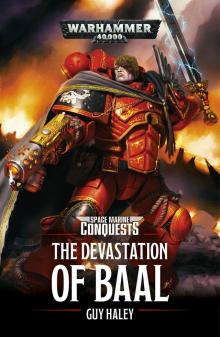 The Devastation of Baal
The Devastation of Baal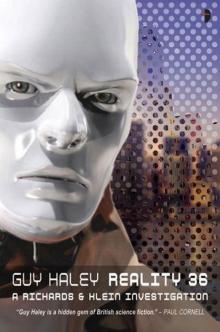 Reality 36: A Richards & Klein Novel
Reality 36: A Richards & Klein Novel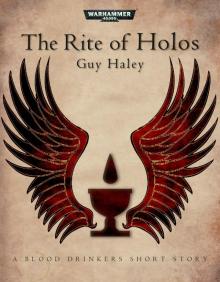 The Rite of Holos
The Rite of Holos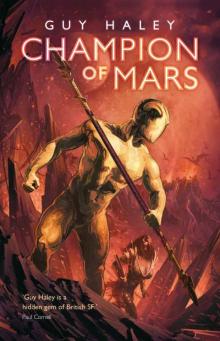 Champion of Mars
Champion of Mars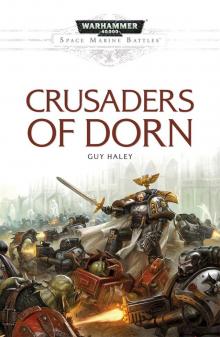 Crusaders of Dorn
Crusaders of Dorn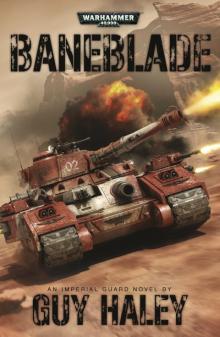 Baneblade
Baneblade